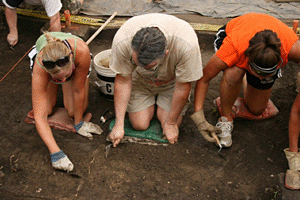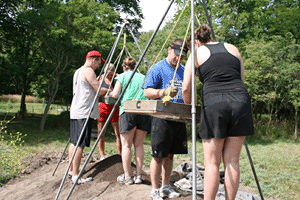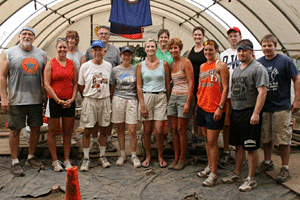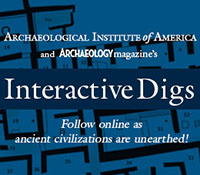This update was prepared by teachers–Tim, Annette, Jon, Natalie, Stacey, Gene, Rick, and Jen–taking the Archeology for Educators K-12, Investigating a Civil War Prison (EDU 533/534) courses this past week.

Teachers excavate one of the 2 meter squares down to subsoil.
Tim: “I have learned much about the science of archeology in the past week. I feel that the hands-on approach works well. The most exciting find for me was the 1862 newspaper we found in the lime. As the time passed I caught myself daydreaming some and wondering what soldiers would think about the activities of the site. If those soldiers could talk, what would they ask us? Would they admire us for searching meticulously through their garbage? Would they laugh at me for picking through egg shells they had not thought twice about throwing out 145 years ago? I then wondered if I will someday, 145 years from now, stand over someone and grin as they try to make sense of what I had done.”
Annette: “I learned a lot about the life in the prison from the letters we shared during lunch. It provided a realistic feel to the location and motivated me to learn more.”
Jon: “The art of archeology only benefits those who are patient. The digging and scratching away of dirt is more intriguing when artifacts are found.”

Working at the screens
Natalie: “When you learn more about a topic it definitely becomes more interesting. Once the purpose for the digging and method of digging was explained the experience became a positive one.”
Stacey: “I learned about hard rubber, from a talk given by Mike Woshner, just before Jen found a piece of hard rubber while screening dirt from our unit inside the weather port. Mike’s discussion helped motivate me to continue to dig.” [Note: Mike Woshner is author of India Rubber and Gutta-Percha in the Civil War Era.]
Gene: “It appears as though inmates in the hospital were better off than the average prisoner based on the trash in sinks.”
Jen: “Being totally honest, I wasn’t the least bit interested in showing up for class after working in the hot, dirty conditions the first day. But, through Marsha’s help throughout the week, Mike the “hard rubber guy’s” discussion and Dr. Bush with his funny nature passion for what he does, I had completely changed my mind by the end of the week. What a great experience.”

From left to right, Dr. Bush, Natalie, Dianna (volunteer), Mike Woshner, Gene, Laurel (vol.), Val (vol.), Annette, Dr. George, Stacey, Jen, Jon, Rick, Tim
The class dispelled many myths about archaeology and the process of discovering artifacts at an archeological site. We all would agree the methodology of archeology was important in order to keep us motivated and interested in the subject matter. We understood the need for precision in digging and recording much better during our troweling in the latrine when we were discovering substantial items. On a side note, the importance of the methodology pointed out something to those who are teachers. They began to discuss and understand how students sometimes feel when they do not know why they are doing something, and for this reason, can lose interest in the subject matter at hand. Overall, learning about prison life at Johnson’s Island was enlightening. We all appreciated having knowledgeable teachers who were passionate about their field of study and shared it with us they way they did.

